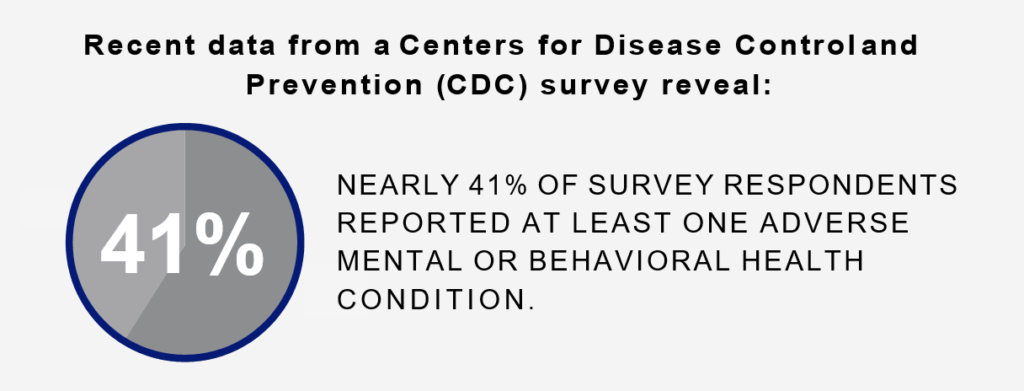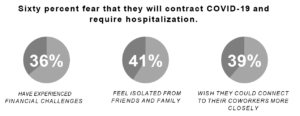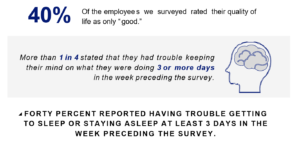When teams struggle, it affects their productivity and the company’s bottom line. As part of a research team that evaluated the effects of another “Black Swan” event, Hurricane Katrina, I can draw direct inferences from those effects to the impact of COVID-19 and the time that it will take teams to recover.
We know how important this issue is because we hear the refrain from business owners and executives every day: You’re exhausted. Your teams are exhausted. And you worry that there’s far more under the surface, things your teams are experiencing that they’re just not talking about.
Chances are, you’re right.
Do you know whether your team might be experiencing these effects?
Answering that question proves critically important–not just because it’s the right thing to do but also because it unlocks your opportunity to optimize growth, loyalty, and productivity by battling burnout, breakdowns, and depression. But many–perhaps most–companies find themselves unable to identify clearly the issues that are affecting their teams. And you just can’t support your team effectively if you don’t know what they need.
We collected data to “take the temperature” of teams to identify what resources they need. The data that we have collected from teams, coupled with our data from Hurricane Katrina, underscore the importance of supporting your teams in the months to come. As we’re about to share, the team data show the effects of pandemic stress. And our Katrina data showed that levels of depressed mood stood at twice their pre-Katrina levels 18 months after the storm.
That’s why, even as COVID vaccines emerge, mental health effects will likely persist for quite some time. But our research also reveals that resources, such as social support, can mitigate those effects dramatically.
How is COVID-19 impacting employees? Data collected so far reveal that:
Not surprisingly, the stress that these numbers reveal exacts a measurable toll on everything from employee mental health to performance.
Think about that for a minute: If these numbers hold true for YOUR employees – if they’re anxious about contracting COVID, feeling isolated from friends and family and even from their coworkers, and finding these stresses manifested in disrupted sleep, trouble focusing, and other symptoms of depressed mood — you can easily see productivity effects, health effects, healthcare costs, and other direct and indirect effects in your company.
The question is, what can you do to combat these effects? In this article, we provide some practical, actionable steps that you can take to better support employees especially during the COVID-19 pandemic.
SHOW YOUR APPRECIATION MEANINGFULLY
In stressful times, a little appreciation can go a long way. Write a hand- written note to team members (or if that’s not possible, print a letter that you can sign and send to each team member). Acknowledge the challenges you’ve faced and thank team members for specific contributions or accomplishments. Then, go beyond that to focus also on specific ways in which team members have found novel ways to surmount challenges; persevered through adversity; remained connected to the team and to your customers; and supported each other. Highlight examples wherever possible.
KEEP YOUR TEAM CONNECTED TO EACH OTHER
We mentioned above that social support proved critical in Katrina – as it does in virtually all stressful situations – in mitigating the effects of that disaster. Keeping your team members connected to each other can do a great deal to help them garner support. In many cases, the support that team members give and receive from each other takes the form of instrumental support – help getting things done. Whether it’s pitching in to help with a project or brainstorming a new approach to a problem, this form of social support proves vital not only in reducing stress but also in maintaining productivity.
To “jump start” that instrumental support, consider creating a “virtual team circle.” Invite team members to identify one thing on which they need help–it might be help with a project, tips on juggling remote school with work, or ideas for making a virtual birthday party fun. Share the items among the team and invite them to contribute responses and/or provide help to each other.
Work to identify events that can bring coworkers together. Hire a musician to host a virtual concert and send food items to team members to enjoy during the event. Or hire a comedian for a comedy night. Provide a “ virtual walking tour” of a city that your employees may never have visited. Bring in a mixologist to show team members how to make fun beverages and send the ingredients to them in advance.
Consider also supporting your team in giving back, as a way to bring them together. Invite the team to design a charity event in which they can all participate/to which they can all contribute. Whether you collect items for the local food bank, write letters to elderly individuals, or send “care packages” to nursing home staff or hospital employees, you can make a difference and unite your team for the cause. You can also share talents virtually, by editing resumes for unemployed individuals, creating content for non- profits, or finding ways to support small businesses who may be struggling. Or, if you want to help your team make individual contributions, provide a “give back bonus” to each team member that they can use for the charity or cause of their choice.
ENCOURAGE YOUR TEAM TO STAY CONNECTED TO FRIENDS AND FAMILY
Team members also need expressive or emotional support. That type of support typically comes from close friends and family– although it can also come from coworkers who forge close friendships. If your company offers Zoom accounts, encourage team members to use them to meet virtually with friends or family whom they cannot see in person. Invite them to share pictures of fun virtual events that they’ve enjoyed.
GIVE YOUR TEAM TIME TO ‘DE- STRESS’
Your employees may need “permission” to take some time off to care for themselves. Consider giving them a day off in which they do something to “de-stress.” Provide a worksheet that lists positive coping strategies and “self-care” activities ( you can find those by clicking HERE* or HERE*. Offering suggestions will help them choose activities that are more effective in decreasing stress–for example, watching television with family members will likely prove more relaxing than “zoning out” in front of the television alone. Invite employees to contribute descriptions and/or pictures of the activities that they enjoyed, so they can share ideas and encourage each other. To make it fun, compile activities into BINGO sheets so employees can earn a BINGO by completing five of the activities.
PROVIDE MENTAL HEALTH RESOURCES
According to a survey by Business Group on Health, many businesses expanded access to tele-mental health and emotional well-being services in 2020 and also reduced out-of-pocket costs for virtual mental health services. That trend is expected to increase through 2021. Some employers offer tele-mental health services not only to their employees but also to employees’ immediate families. Providing lists of resources, such as online support groups for employees who have survived COVID or who have lost a friend or family member, can also prove helpful.
GO TO THE SOURCE OF THE PROBLEM
As you consider how to support your team, explore ways that you might be able to structure work in ways that can actually reduce stress. Consider scheduling informal sessions in which team members discuss what parts of their days, and their jobs, prove most challenging. Try to understand not just how your team members have been impacted but also how members of their households may have been affected. Use this information to consider how you might structure work in ways that prove helpful for your team.
MOVING FORWARD TO EMERGE STRONG
The challenging reality is that the effects of the COVID-19 pandemic will linger through 2021 and potentially beyond. But you hold the power to affect how quickly your company, and your team, recover. We believe you have a tremendous opportunity to “do well by doing good:” If you take action to support your teams and provide effective resources to them, you can not only earn their loyalty and boost their productivity but also reap bottom-line benefits.














